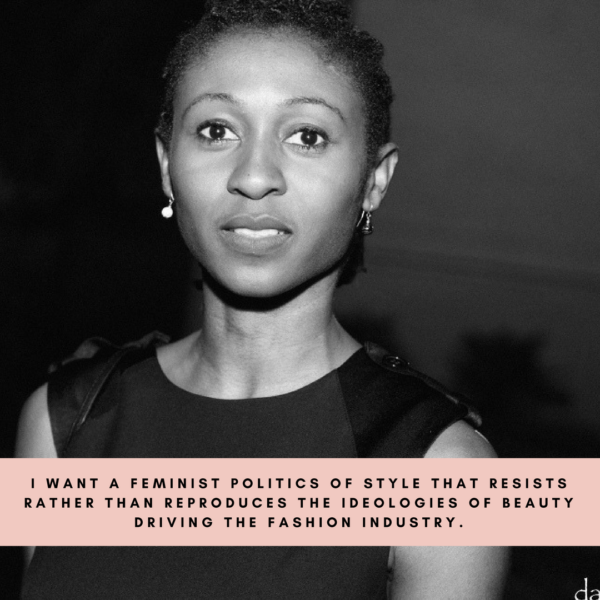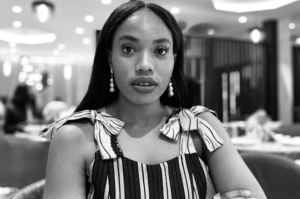Chimamanda Adichie is endlessly inspiring. It is a beautiful thing that one of the most powerful figures of contemporary feminism is an African woman. It is history making, and it is empowering. Between her viral TED videos and her collaboration with Beyonce, she has single handedly brought feminism from the cold dark halls of the ivory towers to the streets and to our social media lives. Her public image is fluid and open. She has made it clear that she would not be held down by norms of an intellectual culture that require women to see smartness and the aspiration for beauty as mutually exclusive things. Adichie’s insistence on being a brilliant and powerful woman in her own terms has been beyond refreshing.
In the past weeks Adichie expanded her influence as a feminist intellectual by making a foray into the sphere of consumer culture. She became the face of Boots No7 beauty campaign. Boots is a UK-based cosmetic company and No 7 is a range of beauty products that includes everything from anti-aging cream to a makeup line. The link between the campaign and feminist values was established early on. In one of the campaign videos, Adichie draws attention to her influence as writer but also to her role as a feminist figure. “My writing has given me a platform,” she remarks, “it gives me the opportunity to talk about things I really care about. Things like feminism, for example.” She also talks about awakening to a truth about makeup—a truth that made her embrace the complexities of a feminism that refuses to disavow femininity.
It is therefore not surprising that in days and weeks following the news of the campaign Adichie’s partnership with this cosmetic company became celebrated as a triumphant moment for feminist discourse. Jezebel.com and elle.com saw in Adichie’s partnership with Boots an attempt to rethink key assumptions about the politics of style surrounding feminism. CNN.com observes that what saves it from being “a meaningless celebrity endorsement” is the feminist significance of the campaign. For Forbes.com, the significance goes beyond feminism: “with her Boots beauty campaign, Adichie has another platform to relay issues of feminism, racial equality, and Nigerian colonialism to a mainstream audience.”
As inspiring as this all sounds, there is something a bit off. Deep down you suspect that the connection between feminism and the business of buying and selling makeup that these commentators are trying so hard to push is not as self-evident as it appears. That is why in the name of a feminism that is self-reflective and open to questioning its own assumptions, I am asking that we take a step back from the popular consensus that Adichie’s Boots endorsement does wonders for feminism. Appreciating the symbolic value of Adichie’s partnership with Boots should not prevent us from resisting the easy equivalence being made between Boots cosmetics and feminism via Adichie’s endorsement.
But no one is better suited to tell us how Boots cosmetics, makeup, and feminism all fit together than Adichie herself, so let’s look closely at her own attempt to contextualize the campaign. In the weeks since news of the endorsement broke, Adichie has spoken extensively on how her feminist values align with the ideas about beauty she wants us to associate with Boots and their products.
She makes a powerful case for a feminist politics of style that embraces femininity. Here is how she puts it in an interview with The Cut:
It’s the pitting of feminism against femininity — that they are mutually exclusive, that bothers me. It’s something that I really strongly reject. It’s problematic on many levels. You hear talk about women looking serious when they wear a power suit and if you wear a dress it doesn’t communicate power. Our definition of what normally comes across as powerful very much reflects male ideas, and the things our society traditionally considers masculine are not things that we generally think of as shallow or frivolous. The things that are considered traditionally feminine are considered shallow and frivolous, like beauty and fashion. There are many intelligent, thoughtful, innovative women who are interested in beauty and fashion, and we shouldn’t have any judgment about that.
Adichie is doing something really cool here. She is exposing the patriarchal impulse at the heart of a feminist discourse that disavows femininity. She does this by turning an age-old assumption about feminism on its head. Becoming less feminine isn’t necessarily liberating or empowering. Rather it buys into the idea that masculinity is the image and measure of power. It is therefore in the service of feminism to do away with the antagonism between, on the one hand, the fashion-loving, lipstick wearing, and stiletto strutting woman and the woman seeking intellectual validation in the rejection of make up. But how do we do away with this antagonism? How do we rise above the absurdity of a feminism that disavows femininity?
Another way to put the question is to ask: is wearing makeup or not wearing makeup feminist? For Adichie, the feminist act lies not in placing value on one over the other but in reserving the power to choose either or both and still be feminist. “I like makeup very much,” she remarks, “but I also really like my face when I take my makeup off. I like to dress up, but I also really like myself when I’m not dressed up.”
But if wearing make up is to be as legitimately feminist as not wearing make up, what has to change is not so much feminism as it is our attitude towards makeup. Thus in the video ad for the campaign, Adichie declares “makeup doesn’t actually mean anything. It’s simply makeup.” In order to assimilate makeup into a feminist logic, Adichie has to first empty it of its meaning. Using makeup doesn’t mean anything in the same way that drinking coffee doesn’t mean anything. Once you realize that the value of make up lies solely in the confidence it can give, you can let go of all the other political and ideological stuff it’s been associated with.
This message is precisely what calls for pause. Makeup can never be just make up for the simple reason that it has already been assigned meaning by a multi-billion dollar industry that sets the rules for what counts as beautiful. Granted these rules can be expanded to include more races or body types or sexual orientations, but what does not change is the fact that the individual female user of makeup doesn’t get to decide what it means to be beautiful. She doesn’t get to decide what makeup means or does not mean. The fashion industrial complex does. It defines the terms on which we think of ourselves as beautiful or not. It tells us to embrace the freedom of choosing even though it defines the limits of the choices we make: makeup or no makeup or both? Ruby Woo or Flat Out Fabulous? Normal/Oily or Normal/Dry or Dry/Very Dry? Anti-aging serum or early defense sunscreen or both? When we ask women to believe that make up doesn’t mean anything we are inadvertently asking them to forget that a billion dollar industry is profiting from controlling the narratives that ascribe value to their bodies.
I want a feminism that never allows us to forget this truth however unpleasant it might be. Feminism shouldn’t reproduce ideologies that blind us to the matrix of interests shaping our bodies. It should expose it. It should compel us to be vigilant and self-aware about the powerful forces defining our beliefs about what we see in the mirror. Even as we embrace the use of makeup, even as we live out the multiple dimensions of feminine ideals set up for us by the fashion industry, we should be able to take comfort in knowing that feminism is there to help us find spaces for resistance and critique. In other words, I want a feminist politics of style that resists rather than reproduces the ideologies of beauty driving the fashion industry.
Adichie has actually commented on the beauty industry. In an early interview granted to Vogue, Adichie says that the campaign is linked to her objective to change the way beauty products are sold to women. This is how she puts it: “I think much of beauty advertising relies on a false premise – that women need to be treated in an infantile way, given a ‘fantasy’ to aspire to… Real women are already inspired by other real women, so perhaps beauty advertising needs to get on board.” Her boots campaign, she suggests, is, in part, an attempt to get the industry to advertise beauty products differently. There is nothing inherently wrong with helping a billion-dollar industry fine-tune its tactics for selling things to women. But how is that feminist? When did furthering the interest of capital at the expense of the female consumer become a feminist project?
Adichie has a powerful global brand—which she is free to use however she likes. In fact, there is something poetically entrepreneurial about a highbrow literary author making waves in the consumer side of things. What I think becomes slightly disingenuous and that opens her up to legitimate criticism is exploiting the feminist angle of her influence.
There are pitfalls to reducing feminism to a price tag or transforming it into this abstract thing conferred on objects we buy and sell. We risk transposing feminism from the material world of policies, laws, and systemic inequality into this abstract idea of beauty that is then easily commodified by big money industries like the beauty industry—which, it turns out, is a horrifyingly male dominated industry.
I don’t want someone to coax me into buying lipstick or facial wash because it evokes ideals of feminism. Feminism is this thing that I want to talk about in relation to ideology, politics, and the daily hustle of being a woman in a man’s world.
We are, thus, left with the question: should it matter that feminism—the politics and aspiration for gender equality—is being put to work for the interest of capital? Or to put it more bluntly, should it matter that feminism is being used to sell makeup?
**************
*Click HERE to learn more about the #MyFeminism essay series. This is the last of the five-essay series. Thank you for joining in the conversation. If you’d like to share your ideas about feminism, stay tuned. We plan on making an open call for a part II of the series in the near future.
Read the first essay in the series—“Complicating the Significance of Gender” by Keside Anosike—HERE.
Read the second essay in the series—“The Unwomanly Feminist” by Pearl Osibu—HERE.
Read the third essay in the series— “On the Necessity of Men” by Kola Tubosun—HERE.
Read the fourth essay in the series — “Remembering to Scream” by Wana Udobang HERE.
**************
About the Author:
Ainehi Edoro is an Assistant Professor of English at Marquette University where she teaches global anglophone literatures. She is also the founder and editor of brittlepaper.com










COMMENTS -
Reader Interactions